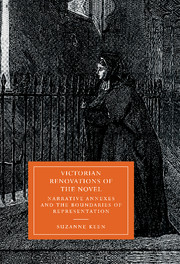Book contents
- Frontmatter
- Contents
- Acknowledgments
- 1 Narrative annexes: altered spaces, altered modes
- 2 Victorian critics, narrative annexes, and prescriptions for the novel
- 3 Norms and narrow spaces: the gendering of limits on representation
- 4 Narrative annexes, social mobility, and class anxiety
- 5 Older, deeper, further: narrative annexes and the extent of the Condition of England
- 6 Victorian annexes and modern form
- Notes
- Bibliography
- Index
- CAMBRIDGE STUDIES IN NINETEENTH-CENTURY LITERATURE AND CULTURE
5 - Older, deeper, further: narrative annexes and the extent of the Condition of England
Published online by Cambridge University Press: 13 November 2009
- Frontmatter
- Contents
- Acknowledgments
- 1 Narrative annexes: altered spaces, altered modes
- 2 Victorian critics, narrative annexes, and prescriptions for the novel
- 3 Norms and narrow spaces: the gendering of limits on representation
- 4 Narrative annexes, social mobility, and class anxiety
- 5 Older, deeper, further: narrative annexes and the extent of the Condition of England
- 6 Victorian annexes and modern form
- Notes
- Bibliography
- Index
- CAMBRIDGE STUDIES IN NINETEENTH-CENTURY LITERATURE AND CULTURE
Summary
WHY POLITICAL NOVELS HAVE ANNEXES
If the project of political novels is to announce the presence of another world, a second nation, within the realm whose condition they investigate, narrative annexes might seem to be superfluous to them. The political novel already juxtaposes the houses and halls of power with the factory and the dwellings of the poor; it already sets the over-rationalized schoolroom against the circus; contrasts North and South; past and present; city and country; honest and vicious; clean and filthy; victim of industrial life and prosperous (sometimes even well-meaning) factory-owner. The characteristic gesture of the Victorian political novel is to expose the shocking world (Gaskell's homes of workers; Dickens' schools and workhouses; Kingsley's sweatshops and dwellings of the urban poor) and to insist that these zones of disease, degradation, and dehumanization are not only part, but the other half, of England. To call attention to (if not to redress) the evils that afflict the whole nation, political novels choose representative evils to stand for this other nation. These choices notoriously fail to represent working people either as convincing individuals or as diverse groups with their own elaborate social strata. Furthermore, the binary structure of the two nations occludes the variety of suffering endured by workers and the poor in Britain, and this effect was often manipulated to serve political ends. (The history of the Corn Law Repeal and the sequence of Reform Acts is one of alliance politics, which requires the oversimplification of losses and gains in order to consolidate support.) Condition of England novels record the desires of a culture that hopes to reconcile its material needs with both its political and its altruistic hopes.
- Type
- Chapter
- Information
- Victorian Renovations of the NovelNarrative Annexes and the Boundaries of Representation, pp. 145 - 177Publisher: Cambridge University PressPrint publication year: 1997

